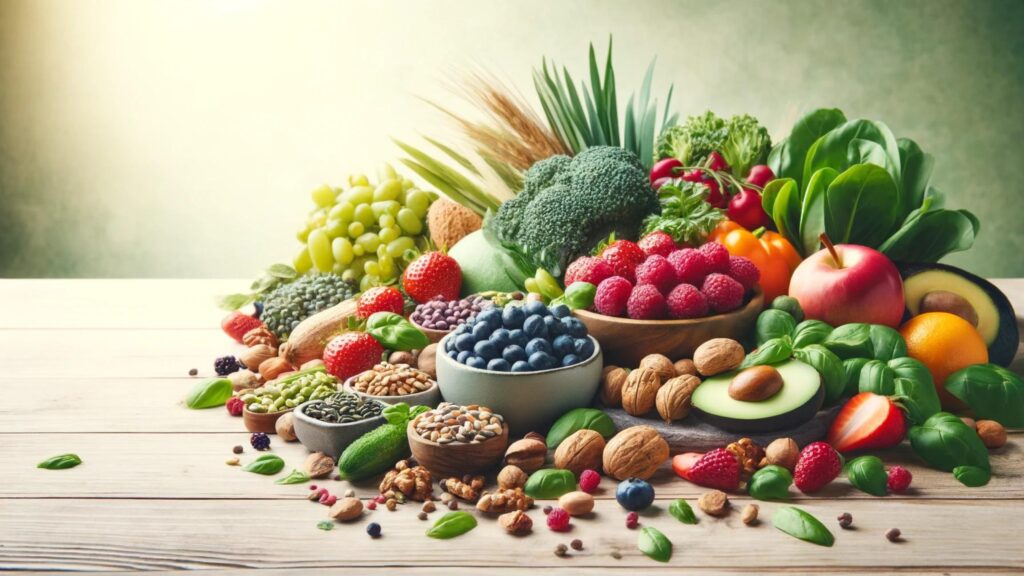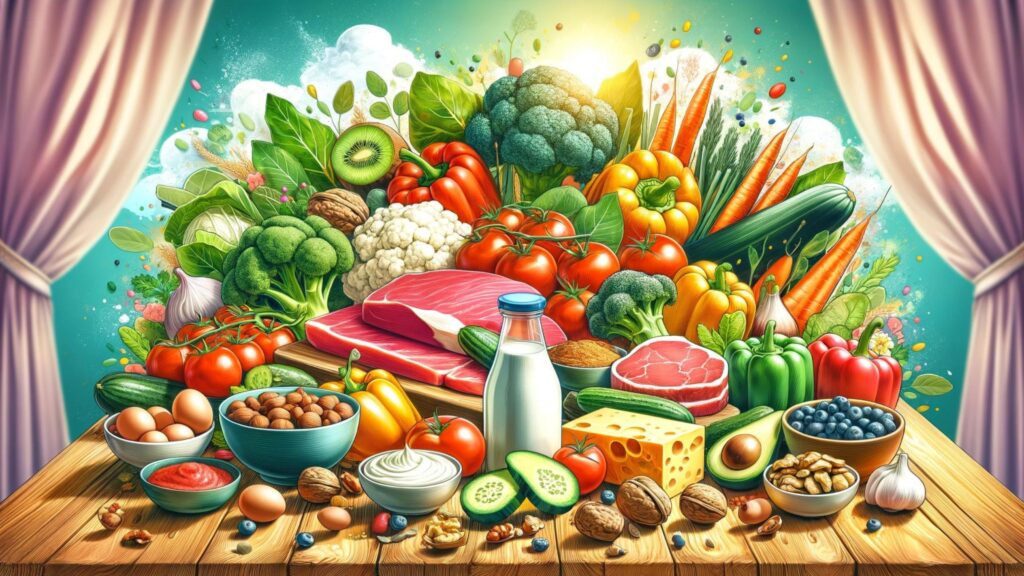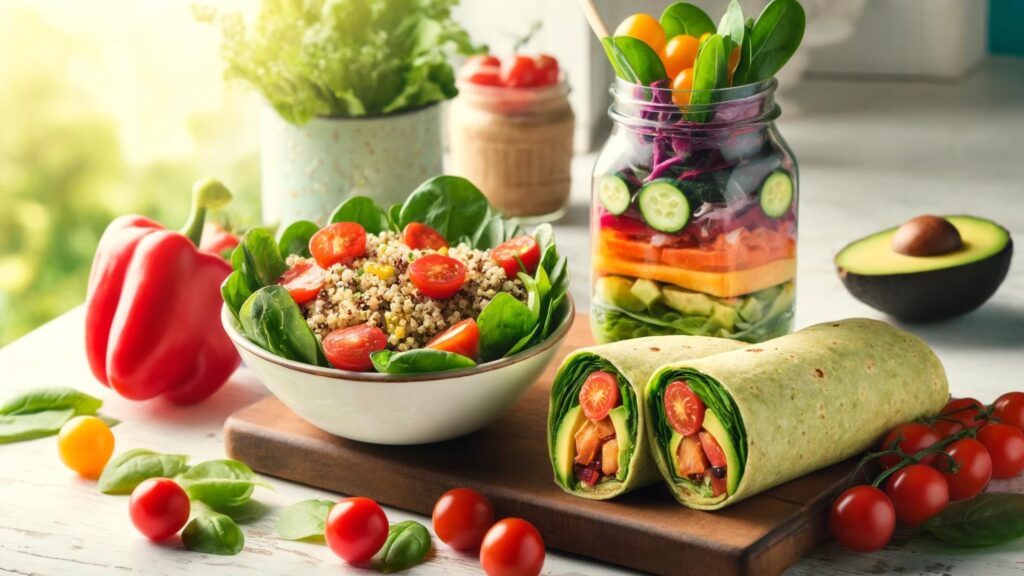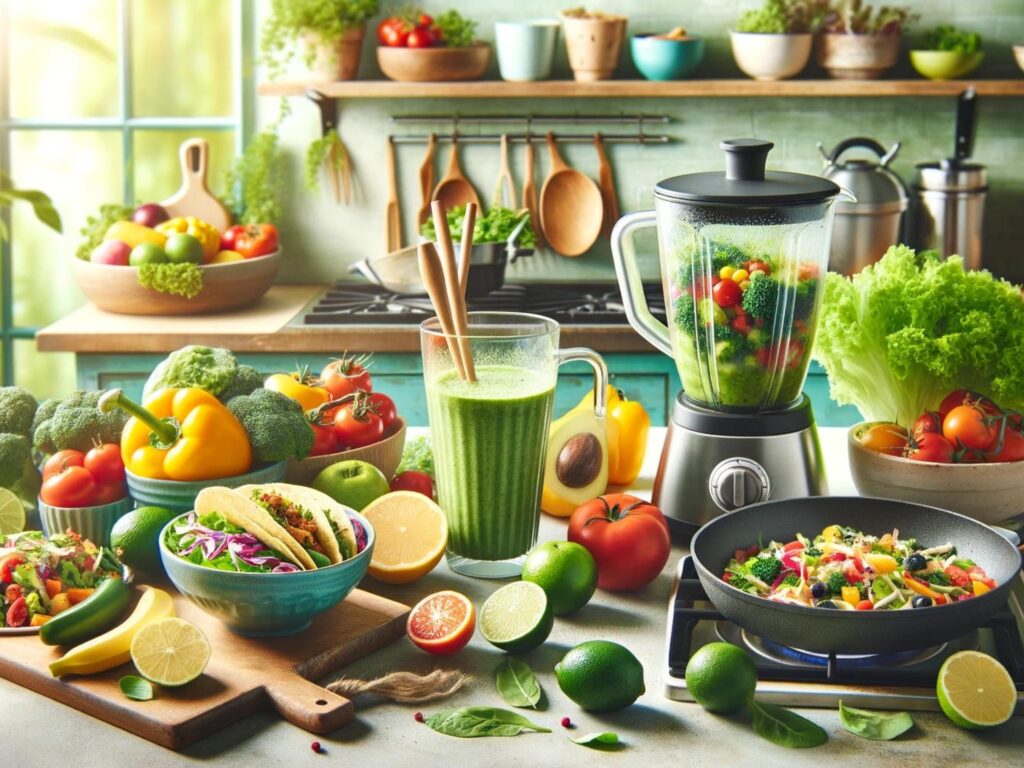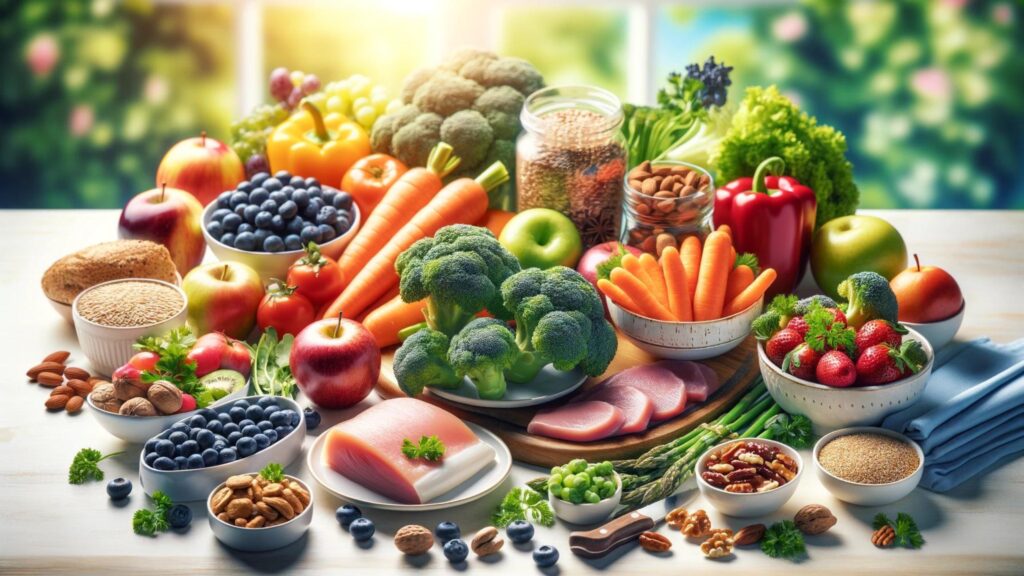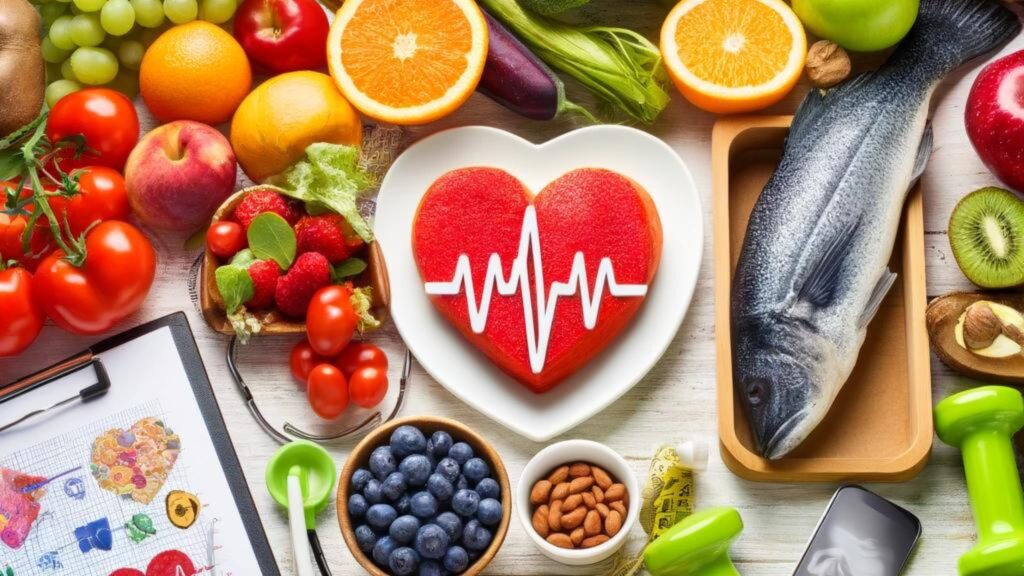In an age of quick fixes and instant gratification, nutrition and diet remain the foundation of genuine, long-term vitality. Superfoods emerge as champions in this field, with the ability to significantly boost one’s energy levels. This article delves into how these potent ingredients can alter your dietary landscape, infusing your body with a powerful burst of energy. Incorporating these nutritional titans into your daily meals not only improves your health, but you also experience sustained energy that will power you through the day. Let’s look at how superfoods can reinvigorate your life, making every moment not only livable but also vibrant.
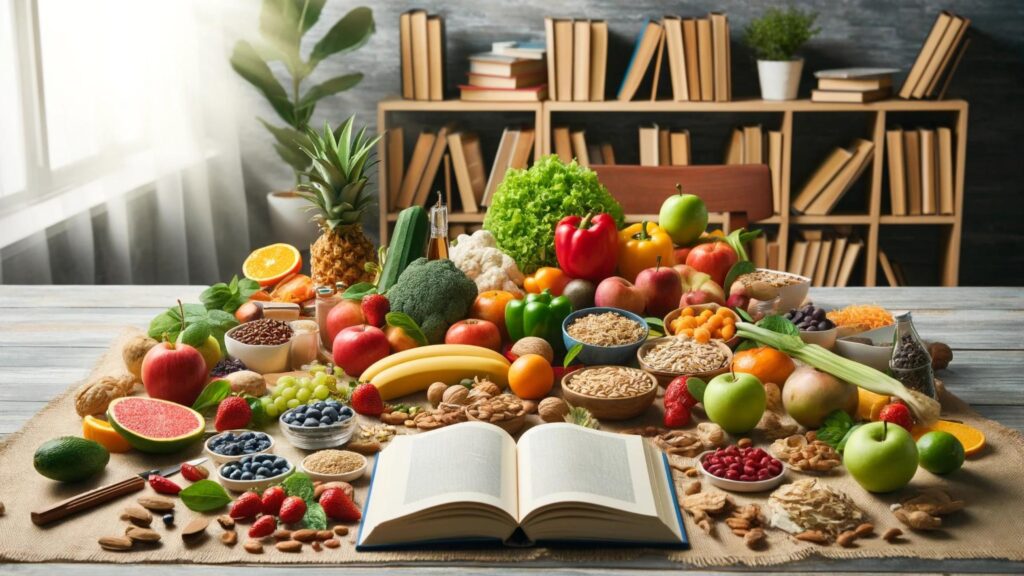
- Introduction to Nutrition and Diet
- Nutrition and Diet: Understanding the Basics
- The role that superfoods play in boosting energy
- Understanding the science of nutrition and diet is essential.
- How Superfoods Affect Daily Energy Levels
- Nutrition and Diet: Dispelling Myths
- Diet's Impact on Overall Well-Being
- Navigating the World of Superfoods
- Nutrition and Diet: Important Components for Success
- Superfoods Explained
- Nutrition and Diet: What Makes a Food 'Super'?
- The Top Energy-Boosting Superfoods for Your Nutrition and Diet
- Nutrition and Diet: The Benefits of Berries and Nuts
- Leafy greens are the unsung heroes of nutrition and diet.
- Seeds and grains are small but powerful additions to your diet.
- Nutrition and Diet: Exploring Exotic Superfoods
- The Science of Antioxidants in Superfoods
- Superfoods from a variety of cultures
- Incorporating superfoods into your diet.
- Nutrition and Diet: Practical Tips for Daily Meals
- Breakfast Ideas: Start the day with nutrition and diet in mind.
- Energizing Lunch Options: Midday Nutrition and Diet Boosts
- Dinner Solutions: Ending the Day with Powerful Nutritional and Dietary Options
- Snacking on Superfoods: Nutrition and Diet on the Move
- Smoothies and juices are liquid nutrition and diet enhancers.
- Nutrition and Diet: Seasonal Superfoods to Look For
- Cooking and preparation methods
- Lifestyle Modifications
- Balance nutrition and diet with physical activity.
- Nutrition and Diet: The Effect of Hydration on Energy Levels.
- Sleep's Relationship with Nutrition and Diet
- Enhancing Stress Management through Better Nutrition and Diet
- Combining Superfoods: Strategies for Effective Nutrient Combination
- Nutrition and Diet: Strategies for Long-Term Success
- Behavioral changes are crucial for effective nutrition and diet regimens.
- Superfoods and Mental Health
- Case studies and real-world examples
- Success Stories: Transformations through Nutrition and Diet
- Nutrition and Diet: Celebrity Endorsements and Their Impact
- Comparative Analysis: Before and After Nutrition and Dietary Changes
- Global Perspectives on Superfoods in Nutrition and Diet
- Nutrition and Diet Challenges: How to Overcome Them
- Nutrition and diet experts offer educational insights.
- Innovative ways to incorporate superfoods into your diet
- Superfoods for Special Diets
- Advanced Nutrition Concepts
- Nutrition and Diet: Going Beyond Calories and Macronutrients
- The role of micronutrients in nutrition and diet.
- Nutrition and Diet: Anti-Inflammatory Foods
- Longevity and Sustainability: Nutrition and Diet
- Adapting Nutrition and Diet as You Age
- The Future of Superfoods in Nutrition and Diet.
- Ethical considerations for nutrition and diet choices
- Nutrient Absorption: Maximizing Your Diet's Benefits
- Nutrition and Diet: A Step-by-Step Guide for Boosting Energy with Superfoods
- Frequently Asked Questions about Nutrition and Diet: Boosting Energy with Superfoods
- 1. What are superfoods exactly, and why are they believed to be beneficial for boosting energy?
- 2. Can superfoods help me increase my daily energy levels?
- 3. What are some examples of superfoods that provide energy?
- 4. How often should I consume superfoods to increase my energy?
- 5. Are there any quick superfood snacks that can provide energy?
- 6. What is the best way to begin incorporating superfoods into your diet?
- 7. Can superfoods replace my regular diet?
- Conclusion
Introduction to Nutrition and Diet
Nutrition and Diet: Understanding the Basics
Nutrition and diet are the foundations of health, encompassing the essential principles of what we eat to fuel our bodies. A balanced diet consists of a combination of macronutrients (proteins, fats, and carbohydrates) and essential micronutrients obtained from a variety of food sources. Understanding these fundamental concepts is critical for creating a nutrition plan that promotes body function and maintains optimal health.
The role that superfoods play in boosting energy
Superfoods are more than just a trend; they are nutritional powerhouses, containing antioxidants, vitamins, and minerals that significantly boost energy levels. Including foods like blueberries, spinach, and salmon in one’s diet can result in noticeable increases in energy, stamina, and overall vitality. These foods do more than just energize; they improve your body’s ability to perform at its best.
Understanding the science of nutrition and diet is essential.
Nutrition science studies how food transforms into body tissues or provides energy. It is a complex combination of biochemistry, physiology, and molecular biology. This science investigates how the body processes food and the dynamic balance between health and disease. Understanding this enables people to make informed choices about their eating habits and lifestyle.
How Superfoods Affect Daily Energy Levels
Superfoods boost energy levels not only by providing calories, but also by regulating blood sugar and improving metabolic health. Foods high in complex carbohydrates and fiber, such as quinoa and chia seeds, provide consistent energy throughout the day, avoiding the mid-afternoon slump that more refined foods often cause.
Nutrition and Diet: Dispelling Myths
Many myths cloud our understanding of nutrition, such as the belief that all fats are bad or that diets must be extremely restrictive to be effective. Dispelling these myths is critical for cultivating a balanced approach to eating that promotes health without sacrificing enjoyment of food. It’s about understanding the nutritional value and impact of different foods on our bodies.
Diet’s Impact on Overall Well-Being
Diet has a significant and far-reaching impact on overall well-being. Nutrient-dense foods help to improve mental and physical health, boost immune function, and lower the risk of chronic diseases. A well-planned diet can have an impact on every aspect of life, from cognitive function and emotional stability to physical endurance and longevity.
Navigating the World of Superfoods
Navigating the world of superfoods entails more than simply adding exotic berries to your shopping cart. It entails understanding their origins, nutritional value, and optimal methods of consumption. This knowledge enables the optimal incorporation of these nutritional powerhouses into a regular diet, maximizing health benefits.
Nutrition and Diet: Important Components for Success
Variety, balance, and moderation are essential components of any successful nutrition and diet plan. Integrating a variety of foods ensures a wide range of nutrients, while balanced portions keep calorie intake under control. Moderation, particularly in the consumption of processed and high-sugar foods, helps maintain a healthy body weight and lowers disease risk, laying the groundwork for a strong and vibrant lifestyle.
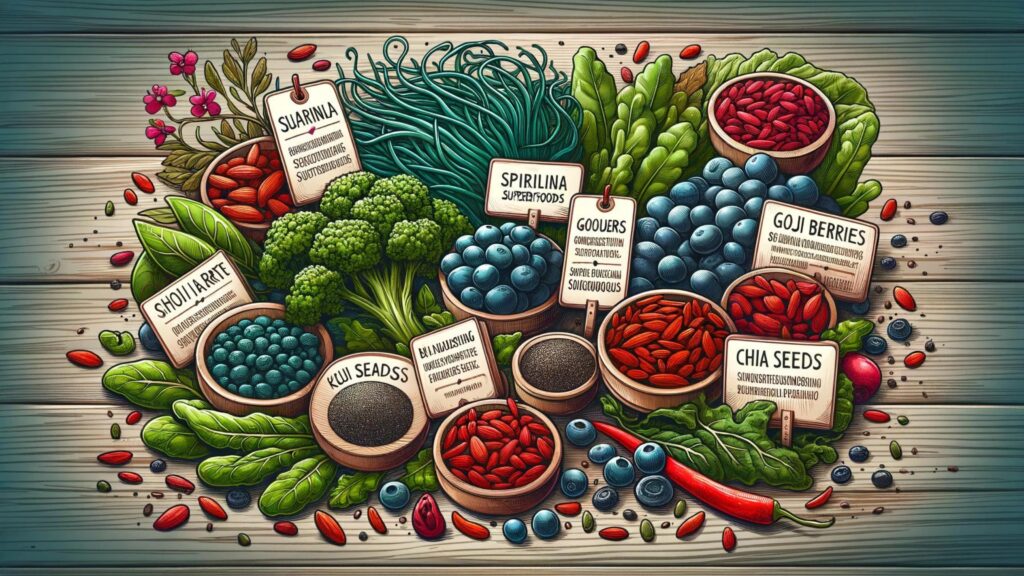
Superfoods Explained
Nutrition and Diet: What Makes a Food ‘Super’?
Superfoods set themselves apart with their high nutrient density and low caloric content, offering a potent source of vitamins, minerals, antioxidants, and other health-promoting compounds. Their ability to support metabolic processes, improve immune function, and prevent chronic diseases makes them an excellent addition to any well-balanced diet. These foods provide more than just sustenance; they also have medicinal properties that strengthen the body against the stresses of modern life.
The Top Energy-Boosting Superfoods for Your Nutrition and Diet
Integrate superfoods such as spirulina, acai berries, and chia seeds into your daily routine to boost your energy levels. These superfoods provide long-lasting energy via complex carbohydrates and fibers, eliminating the sharp spikes and troughs associated with sugary snacks. Including these foods in your diet can improve your energy management, increasing your physical and cognitive endurance throughout the day.
Nutrition and Diet: The Benefits of Berries and Nuts
Berries and nuts are not only delicious, but they also contain essential nutrients. Nuts like almonds and walnuts, which are high in omega-3 fatty acids, promote brain health, whereas berries like blueberries and raspberries contain potent antioxidants that protect cells from damage. This combination supports a strong cardiovascular system and is known to reduce inflammation, making it an essential component of any preventive health strategy.
Leafy greens are the unsung heroes of nutrition and diet.
Leafy greens such as kale, spinach, and Swiss chard are important because they contain high levels of vitamins A, C, and K, as well as minerals like iron and calcium. These greens are essential for lowering the risk of chronic illnesses and promoting daily peak performance. Their versatility in dishes—from smoothies to salads—makes them a simple addition to any meal, improving both flavor and nutritional value.
Seeds and grains are small but powerful additions to your diet.
Incorporating seeds like flaxseeds and hemp seeds, as well as grains like quinoa and oats, can have a significant impact on your health. These tiny titans are high in fiber, protein, and essential fatty acids, which help to maintain heart health and improve digestive function. Their low glycemic index makes them ideal for long-term energy management and satiety, both of which are essential for weight management and metabolic health.
Nutrition and Diet: Exploring Exotic Superfoods
Exotic superfoods like goji berries, moringa, and maca root add a burst of variety and excitement to your diet. People celebrate these foods not only for their unique flavors but also for their adaptogenic properties,which help the body manage stress and maintain balance. Incorporating these into your diet can lead to new culinary experiences while also improving your body’s resilience.
The Science of Antioxidants in Superfoods
Antioxidants significantly contribute to the fight against oxidative stress, a condition associated with aging and numerous chronic illnesses. Superfoods high in antioxidants, such as dark chocolate and pecans, provide protection against cellular damage. This scientific insight emphasizes the importance of incorporating antioxidant-rich foods into your diet to maintain long-term health and vitality.
Superfoods from a variety of cultures
The incorporation of superfoods into diets across cultures not only enriches culinary traditions but also improves overall community health. For centuries, people have revered these superfoods, ranging from chia seeds in Aztec diets to turmeric in Indian curries. Exploring their cultural significance can provide deeper insights into their long-term health benefits and inspire new applications in modern nutrition practices.

Incorporating superfoods into your diet.
Nutrition and Diet: Practical Tips for Daily Meals
The journey of incorporating superfoods into your daily meals begins with strategic meal planning. Start by replacing simple carbohydrates with super grains like quinoa or amaranth. Introduce a variety of colorful vegetables and fruits to ensure a full range of antioxidants and vitamins. Planning meals around superfoods not only increases nutrient intake but also adds variety to your diet, making it as tasty as it is nutritious.
Breakfast Ideas: Start the day with nutrition and diet in mind.
Start your mornings with a superfood-rich breakfast. A bowl of oatmeal with chia seeds, fresh berries, and a drizzle of almond butter contains a well-balanced amount of protein, fat, and carbohydrates. This meal provides your body with slow-release energy, which helps to keep blood sugar levels stable throughout the morning—essential for optimal brain function and physical energy.
Energizing Lunch Options: Midday Nutrition and Diet Boosts
A vibrant superfood salad will boost the energy of your midday meal. Mix leafy greens like spinach and kale with colorful vegetables, nuts, and a lean protein like grilled salmon or tofu. Dress with a vitamin C-rich citrus vinaigrette to help the greens absorb iron. This type of lunch contains a high concentration of nutrients, which boosts energy levels and productivity throughout the day.
Dinner Solutions: Ending the Day with Powerful Nutritional and Dietary Options
End your day with a dinner that combines comfort and nutrition. A stir-fry with broccoli, bell peppers, and carrots served over barley or wild rice provides essential nutrients while satisfying evening hunger. This meal is not only quick to prepare but also ideal for incorporating various superfoods to aid in recovery and rejuvenation overnight.
Snacking on Superfoods: Nutrition and Diet on the Move
For those who need a snack, consider portable superfoods. Almonds, walnuts, and dried goji berries combine to create a convenient snack mix that provides a quick energy boost as well as antioxidants and healthy fats. These snacks are ideal for active lifestyles because they provide sustained energy without the use of processed sugars or artificial ingredients.
Smoothies and juices are liquid nutrition and diet enhancers.
Smoothies and juices are great ways to get a variety of superfoods into your diet, especially if you have a busy schedule. Combine spinach, kale, frozen berries, and a banana with a scoop of protein powder to make a nutrient-dense drink. This type of liquid meal provides a concentrated dose of vitamins and minerals in an easily absorbed form.
Nutrition and Diet: Seasonal Superfoods to Look For
Eating seasonally is not only more sustainable, but it also provides more nutrients. For the freshest options, seek out local superfoods that peak during different seasons. In the spring, embrace leafy greens; in the summer, stock up on berries; in the fall, switch to squash and apples; and in the winter, use root vegetables. Each season brings its own set of superfoods that can help you improve your diet naturally.
Cooking and preparation methods
Maximizing the nutritional benefits of superfoods also requires proper cooking and preparation techniques. In contrast to boiling, which can leach nutrients, steaming or sautéing vegetables quickly in a small amount of olive oil helps preserve vitamins and minerals. Soaking or sprouting grains and seeds can improve digestibility and nutrient availability, increasing their nutritional value.

Lifestyle Modifications
Balance nutrition and diet with physical activity.
A balanced lifestyle requires coordinating your nutrition and diet with regular physical activity. This balance is more than just calorie intake and expenditure; it is about improving the body’s metabolism and increasing the efficacy of nutrients absorbed from your diet. Incorporating a routine that combines cardio and strength training can help to maximize the performance benefits of a superfood-rich diet, ensuring that both the body and mind are ready for peak performance.
Nutrition and Diet: The Effect of Hydration on Energy Levels.
Hydration is essential for maintaining energy levels and improving metabolic health. Water is more than just a thirst quencher; it helps transport nutrients in the bloodstream and aids in digestion and absorption of food. Incorporating hydrating foods like cucumbers, strawberries, and watermelon into your diet, along with regular water intake, can significantly improve your hydration status, which has a direct impact on your energy level and overall health.
Sleep’s Relationship with Nutrition and Diet
The interplay between sleep and nutrition is critical but frequently overlooked. A magnesium- and calcium-rich diet that includes superfoods like almonds and spinach can improve sleep quality by regulating the body’s internal clock and improving sleep cycles. In contrast, insufficient sleep can disrupt dietary habits, resulting in poor food choices. Prioritizing sleep is critical when eating a diet that supports all bodily processes.
Enhancing Stress Management through Better Nutrition and Diet
Diet affects the body’s hormonal balance, making it important for stress management. Foods high in omega-3 fatty acids, such as flax seeds and walnuts, can lower stress hormone levels in the body, whereas antioxidants found in berries and dark chocolate can combat oxidative stress. By strategically incorporating these superfoods, you can create a diet that not only nourishes but also protects against the stresses of modern life.
Combining Superfoods: Strategies for Effective Nutrient Combination
To maximize the health benefits of superfoods, a proper nutrient combination is essential. Pairing vitamin C-rich foods like oranges with iron-rich spinach can improve iron absorption, which is essential for energy production. Similarly, combining avocado’s healthy fats with carrots’ carotenoid content can boost antioxidant absorption. Understanding and applying these combinations can greatly increase the nutritional value of your meals.
Nutrition and Diet: Strategies for Long-Term Success
Planning for adaptability and resilience is critical to developing sustainable nutrition and diet practices. It entails setting realistic goals, anticipating challenges, and adjusting strategies as circumstances change. This long-term perspective ensures that dietary habits are about more than just short-term goals but also about long-term health and vitality, which is supported by a diet that adapts to your changing nutritional requirements.
Behavioral changes are crucial for effective nutrition and diet regimens.
Transformative dietary changes involve both behavioral shifts and food choices. Routines, such as meal prep and mindful eating, can significantly improve your relationship with food. These habits foster a deeper connection to eating that goes beyond simple nourishment, promoting a holistic approach to diet and overall health.
Superfoods and Mental Health
The link between diet and mental health is significant. Superfoods rich in omega-3 fatty acids, antioxidants, and B vitamins can improve brain function and alleviate symptoms of depression and anxiety. Incorporating a variety of these foods into your diet can benefit both your physical and mental health, demonstrating the importance of nutrition in all aspects of health.

Case studies and real-world examples
Success Stories: Transformations through Nutrition and Diet
Witnessing transformative health journeys through improved nutrition and diet is extremely motivating. Individuals who incorporate superfoods into their daily routine frequently report not only significant weight loss but also increased energy, better skin health, and mental clarity. These stories highlight the power of dietary change to significantly improve quality of life, demonstrating the potential personal health revolutions that await with wise dietary choices.
Nutrition and Diet: Celebrity Endorsements and Their Impact
Celebrity endorsements have had a significant impact on the popularity of specific superfoods. When public figures share their eating habits, particularly their use of superfoods, it raises awareness and adoption among the general public. However, it is critical to critically evaluate these endorsements and understand the nutritional science behind them in order to ensure that these diet trends are beneficial rather than fads.
Comparative Analysis: Before and After Nutrition and Dietary Changes
A comparative analysis of people’s health before and after significant dietary changes reveals stark differences. This segment delves into case studies in which dietary overhauls incorporating superfoods resulted in measurable improvements in health biomarkers such as lower cholesterol levels, lower blood pressure, and better blood sugar control. These cases provide compelling evidence of how strategic dietary interventions can change health outcomes.
Global Perspectives on Superfoods in Nutrition and Diet
Exploring how different cultures incorporate superfoods into their diets reveals a rich tapestry of global dietary practices that promote health and longevity. These diverse practices, ranging from the Mediterranean use of olives and grapes to the Japanese use of seaweed and green tea, shed light on how diverse diets contribute to the health profiles observed in various populations around the world.
Nutrition and Diet Challenges: How to Overcome Them
Adopting a superfood-rich diet presents challenges such as accessibility, affordability, and taste preferences. This section offers practical solutions for overcoming these barriers, such as sourcing locally available alternatives, modifying recipes to improve palatability, and budget-friendly strategies for purchasing high-nutrient foods.
Nutrition and diet experts offer educational insights.
Experts in nutrition and diet contribute a wealth of knowledge to our understanding of optimizing superfoods within a diet. This segment distills their insights into practical advice, emphasizing the value of variety, balance, and holistic eating approaches that can be tailored to individual health needs and goals.
Innovative ways to incorporate superfoods into your diet
Dietary innovation often entails novel ways to incorporate superfoods into everyday meals that go beyond simply adding them to salads. This includes techniques such as incorporating powdered greens into smoothies, fermenting superfoods for gut health, and creating superfood-infused meals that appeal to the entire family, thereby increasing nutritional intake without sacrificing flavor or enjoyment.
Superfoods for Special Diets
Tailoring superfood recommendations to specific diets (such as vegan, gluten-free, or ketogenic) ensures that everyone can benefit from their powerful health benefits. This section provides tailored advice on which superfoods work best within these dietary frameworks, including allergen-free, low-carb, and plant-based superfoods that promote health while adhering to dietary restrictions.

Advanced Nutrition Concepts
Nutrition and Diet: Going Beyond Calories and Macronutrients
While calories and macronutrients provide a basic understanding of dietary requirements, advanced nutritional concepts go deeper, investigating the nuances of food synergy and bioavailability. This approach emphasizes the quality of calories consumed rather than their quantity. Individuals can improve their health beyond simple macronutrient management by focusing on nutrient-dense foods, fostering a more holistic view of nutrition that supports optimal bodily functions.
The role of micronutrients in nutrition and diet.
Micronutrients are essential for maintaining health and preventing disease, despite their smaller quantities compared to macronutrients. These include vitamins and minerals like vitamin D, zinc, and selenium, which are essential for immune function, bone health, and cell survival. Understanding how to incorporate a variety of micronutrient-rich foods into one’s diet can significantly improve overall health and prevent chronic diseases.
Nutrition and Diet: Anti-Inflammatory Foods
Chronic inflammation is the underlying cause of numerous serious diseases, including heart disease, diabetes, and Alzheimer’s. Anti-inflammatory foods like turmeric, blueberries, and leafy greens can help reduce this risk. These foods contain compounds that reduce inflammation markers in the body, offering a natural way to improve health and prevent disease without relying on medications.
Longevity and Sustainability: Nutrition and Diet
The concepts of longevity and sustainability in diet are concerned not only with extending life but also with improving the quality of life as one ages. This entails selecting foods that are not only healthy but also environmentally friendly. Plant-based diets and reduced meat consumption can improve health outcomes while also reducing the ecological footprint, demonstrating that what is good for the individual is also good for the environment.
Adapting Nutrition and Diet as You Age
The nutritional requirements of the body change with age. Elderly people may require more calcium, vitamin D, and B12, but fewer calories. Adapting your diet to meet these changing needs is critical for staying healthy and functional. This could imply increasing consumption of nutrient-dense foods such as fish, whole grains, and vegetables while adjusting portion sizes to meet lower caloric requirements.
The Future of Superfoods in Nutrition and Diet.
The future of superfoods looks promising, and they are likely to become more integrated into mainstream dietary recommendations. Researchers are still discovering the health benefits of lesser-known superfoods, which could lead to new dietary trends and innovations. Most likely, these developments will concentrate on using superfoods to treat or prevent specific health issues, thereby making them a crucial part of medical dietary advice.
Ethical considerations for nutrition and diet choices
Ethical diet considerations cover a wide range of issues, from animal welfare to environmental sustainability. In addition to promoting health, consumers are increasingly seeking foods produced ethically and sustainably. This shift encourages producers to adopt practices that are kinder to the planet and all of its inhabitants, reflecting a holistic approach to health that considers environmental well-being.
Nutrient Absorption: Maximizing Your Diet’s Benefits
Maximizing nutrient absorption is critical for reaping the full benefits of your diet. Factors such as food pairing to improve nutrient uptake, meal timing, and preparation methods can all have an impact on nutrient absorption. Consuming vitamin C-rich foods with iron sources, for example, can increase iron absorption, while reducing phytic acid intake can improve mineral uptake, ensuring that you get the most health benefits from your meals.

Nutrition and Diet: A Step-by-Step Guide for Boosting Energy with Superfoods
Step 1: Understand Your Energy Needs
Goal: Calculate your daily energy needs based on your lifestyle, age, and activity level.
Use an online calculator to calculate your total daily energy expenditure (TDEE).
Assess how you feel throughout the day (e.g., energetic or lethargic) and adjust your caloric intake accordingly.
Step 2: Identifying Important Superfoods
Objective: Create a list of superfoods known for their energy-boosting properties.
Concentrate on superfoods like quinoa, chia seeds, blueberries, spinach, and almonds.
Investigate the nutritional content of each, focusing on their benefits for energy metabolism.
Step 3: Including Superfoods in Your Diet
Plan your meals with at least one superfood in each.
Breakfast: Combine chia seeds and berries in your yogurt or oatmeal.
Lunch: Combine quinoa and spinach for a hearty salad.
Dinner: Add almonds and blueberries to a whole-grain rice dish.
Step 4: Optimal consumption times.
Objective: Determine the best times to consume these superfoods to maximize your energy throughout the day.
Consume complex carbohydrates, such as quinoa, in the morning for sustained energy release.
To avoid midday energy dips, eat light, protein-rich snacks like almonds.
Step 5: Techniques for preparing
Goal: Prepare superfoods in a way that preserves or improves their nutritional value.
Steaming spinach helps to retain its vitamins and minerals.
Soak chia seeds to increase digestibility and nutrient availability.
Step 6: Monitor Your Body’s Response
Objective: Monitor your body’s reaction to the new diet.
Keep a food diary to track your energy levels and overall well-being.
Adjust the amounts or types of superfoods based on your observations and feelings.
Step 7: Maintaining Dietary Changes.
Goal: Make these dietary changes a permanent part of your routine.
Create a weekly routine of shopping for fresh superfoods.
Continue to educate yourself on new superfoods and dietary trends to keep your meals diverse and nutritious.
Including superfoods in your daily diet can help you feel more energized and healthier overall. Following this step-by-step guide will allow you to make informed decisions about how to effectively incorporate these powerful foods into your meals. Remember that consistency is essential to reaping the full benefits of any dietary change.
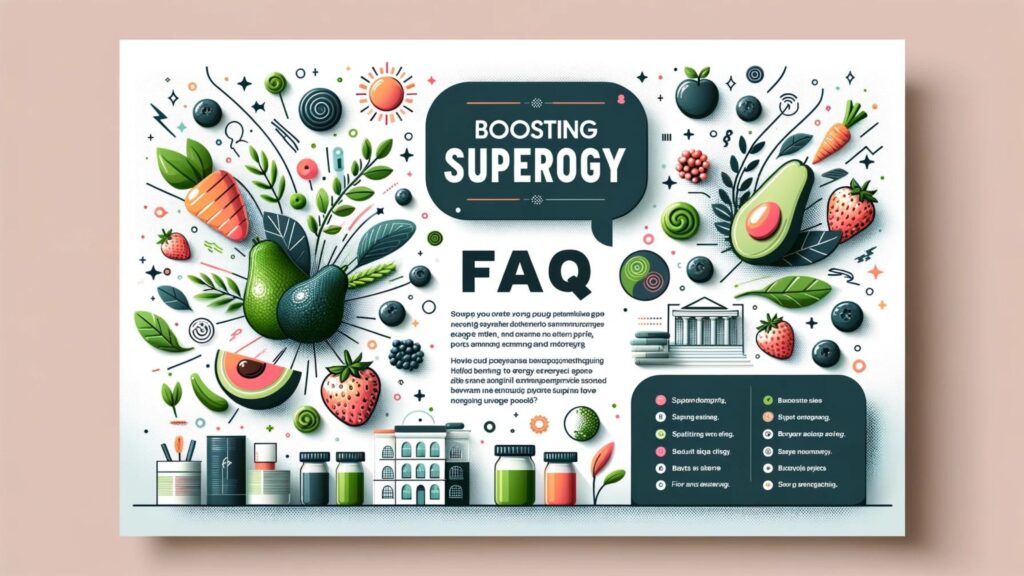
Frequently Asked Questions about Nutrition and Diet: Boosting Energy with Superfoods
1. What are superfoods exactly, and why are they believed to be beneficial for boosting energy?
Answer: Superfoods are foods that are extremely high in vitamins, minerals, antioxidants, and other nutrients that are good for you. They are regarded as important for boosting energy because they contain high levels of nutrients that promote efficient energy production and utilization in the body without adding calories, which can lead to weight gain.
2. Can superfoods help me increase my daily energy levels?
Answer: Superfoods can significantly increase your daily energy levels. Foods like spinach, berries, nuts, and seeds are high in essential nutrients such as magnesium, iron, and B vitamins, which aid in energy metabolism and can help maintain energy levels throughout the day.
3. What are some examples of superfoods that provide energy?
Answer: Some excellent examples of energy-boosting superfoods are:
Quinoa is a complete protein that provides sustained energy via complex carbohydrates.
Chia seeds are high in omega-3 fatty acids and fiber, both of which help to maintain long-term energy levels.
Blueberries are high in antioxidants, which help increase blood flow and oxygen to muscles and tissues.
Almonds are high in healthy fats, protein, and manganese, all of which help with energy production and blood sugar regulation.
4. How often should I consume superfoods to increase my energy?
Answer: Incorporating superfoods into each meal can help you maintain consistent energy levels throughout the day. For example, incorporating a handful of almonds into your breakfast, a spinach salad for lunch, and a quinoa dish for dinner can ensure a steady supply of energy-boosting nutrients.
5. Are there any quick superfood snacks that can provide energy?
Answer: Absolutely! Quick superfood snacks that can boost energy include nuts and dried berries, Greek yogurt with honey and chia seeds, and a banana with almond butter. These snacks are not only nutritious but also provide quick, long-lasting energy boosts.
6. What is the best way to begin incorporating superfoods into your diet?
Answer: Start by incorporating at least one superfood into each meal. Gradually replace processed foods with nutrient-dense superfoods. Experiment with various superfoods to see which ones you enjoy the most and can sustainably incorporate into your diet.
7. Can superfoods replace my regular diet?
Superfoods are beneficial, but they should complement a well-balanced diet, not replace it. Superfoods supplement a diet that should already contain a diverse range of foods to meet all nutritional requirements.
Conclusion
Nutrition and diet strategies based on superfoods not only boost daily energy but also improve long-term health. Embracing these nutrient powerhouses can transform your vitality, providing a natural, long-lasting boost that benefits both mind and body. Learn more about superfoods and their transformative benefits. Visit our Health and Wellness section to learn how nutrition can help you feel more energized. Click here to learn more!

